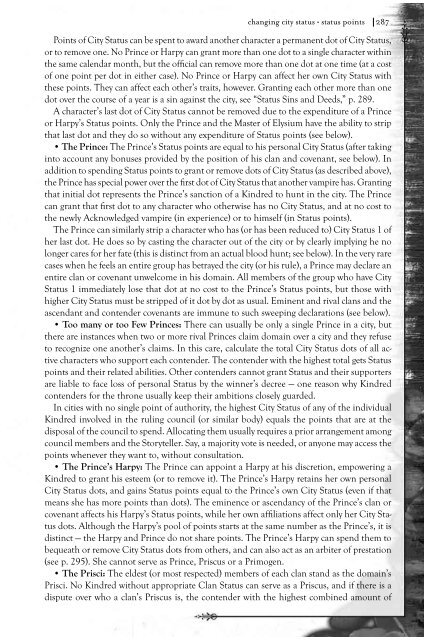Mind's Eye Theatre - Vampire The Requiem.pdf - RoseRed
Mind's Eye Theatre - Vampire The Requiem.pdf - RoseRed
Mind's Eye Theatre - Vampire The Requiem.pdf - RoseRed
You also want an ePaper? Increase the reach of your titles
YUMPU automatically turns print PDFs into web optimized ePapers that Google loves.
changing chapter one: city status society • of status the damned points<br />
287<br />
Points of City Status can be spent to award another character a permanent dot of City Status,<br />
or to remove one. No Prince or Harpy can grant more than one dot to a single character within<br />
the same calendar month, but the offi cial can remove more than one dot at one time (at a cost<br />
of one point per dot in either case). No Prince or Harpy can affect her own City Status with<br />
these points. <strong>The</strong>y can affect each other’s traits, however. Granting each other more than one<br />
dot over the course of a year is a sin against the city, see “Status Sins and Deeds,” p. 289.<br />
A character’s last dot of City Status cannot be removed due to the expenditure of a Prince<br />
or Harpy’s Status points. Only the Prince and the Master of Elysium have the ability to strip<br />
that last dot and they do so without any expenditure of Status points (see below).<br />
• <strong>The</strong> Prince: <strong>The</strong> Prince’s Status points are equal to his personal City Status (after taking<br />
into account any bonuses provided by the position of his clan and covenant, see below). In<br />
addition to spending Status points to grant or remove dots of City Status (as described above),<br />
the Prince has special power over the fi rst dot of City Status that another vampire has. Granting<br />
that initial dot represents the Prince’s sanction of a Kindred to hunt in the city. <strong>The</strong> Prince<br />
can grant that fi rst dot to any character who otherwise has no City Status, and at no cost to<br />
the newly Acknowledged vampire (in experience) or to himself (in Status points).<br />
<strong>The</strong> Prince can similarly strip a character who has (or has been reduced to) City Status 1 of<br />
her last dot. He does so by casting the character out of the city or by clearly implying he no<br />
longer cares for her fate (this is distinct from an actual blood hunt; see below). In the very rare<br />
cases when he feels an entire group has betrayed the city (or his rule), a Prince may declare an<br />
entire clan or covenant unwelcome in his domain. All members of the group who have City<br />
Status 1 immediately lose that dot at no cost to the Prince’s Status points, but those with<br />
higher City Status must be stripped of it dot by dot as usual. Eminent and rival clans and the<br />
ascendant and contender covenants are immune to such sweeping declarations (see below).<br />
• Too many or too Few Princes: <strong>The</strong>re can usually be only a single Prince in a city, but<br />
there are instances when two or more rival Princes claim domain over a city and they refuse<br />
to recognize one another’s claims. In this care, calculate the total City Status dots of all active<br />
characters who support each contender. <strong>The</strong> contender with the highest total gets Status<br />
points and their related abilities. Other contenders cannot grant Status and their supporters<br />
are liable to face loss of personal Status by the winner’s decree — one reason why Kindred<br />
contenders for the throne usually keep their ambitions closely guarded.<br />
In cities with no single point of authority, the highest City Status of any of the individual<br />
Kindred involved in the ruling council (or similar body) equals the points that are at the<br />
disposal of the council to spend. Allocating them usually requires a prior arrangement among<br />
council members and the Storyteller. Say, a majority vote is needed, or anyone may access the<br />
points whenever they want to, without consultation.<br />
• <strong>The</strong> Prince’s Harpy: <strong>The</strong> Prince can appoint a Harpy at his discretion, empowering a<br />
Kindred to grant his esteem (or to remove it). <strong>The</strong> Prince’s Harpy retains her own personal<br />
City Status dots, and gains Status points equal to the Prince’s own City Status (even if that<br />
means she has more points than dots). <strong>The</strong> eminence or ascendancy of the Prince’s clan or<br />
covenant affects his Harpy’s Status points, while her own affi liations affect only her City Status<br />
dots. Although the Harpy’s pool of points starts at the same number as the Prince’s, it is<br />
distinct — the Harpy and Prince do not share points. <strong>The</strong> Prince’s Harpy can spend them to<br />
bequeath or remove City Status dots from others, and can also act as an arbiter of prestation<br />
(see p. 295). She cannot serve as Prince, Priscus or a Primogen.<br />
• <strong>The</strong> Prisci: <strong>The</strong> eldest (or most respected) members of each clan stand as the domain’s<br />
Prisci. No Kindred without appropriate Clan Status can serve as a Priscus, and if there is a<br />
dispute over who a clan’s Priscus is, the contender with the highest combined amount of



